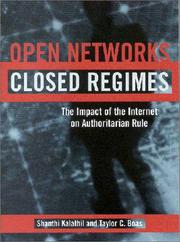| Listing 1 - 3 of 3 |
Sort by
|
Book
ISBN: 1316547582 1316547256 1316547914 1316549569 1316548244 1316443035 1107131146 1107578892 131654527X Year: 2016 Publisher: Cambridge : Cambridge University Press,
Abstract | Keywords | Export | Availability | Bookmark
 Loading...
Loading...Choose an application
- Reference Manager
- EndNote
- RefWorks (Direct export to RefWorks)
How do presidential candidates in new democracies choose their campaign strategies, and what strategies do they adopt? In contrast to the claim that campaigns around the world are becoming more similar to one another, Taylor Boas argues that new democracies are likely to develop nationally specific approaches to electioneering through a process called success contagion. The theory of success contagion holds that the first elected president to complete a successful term in office establishes a national model of campaign strategy that other candidates will adopt in the future. He develops this argument for the cases of Chile, Brazil, and Peru, drawing on interviews with campaign strategists and content analysis of candidates' television advertising from the 1980s through 2011. The author concludes by testing the argument in ten other new democracies around the world, demonstrating substantial support for the theory.
Presidents --- Elections --- Democracy --- Presidency --- Heads of state --- Executive power --- Election. --- Latin America --- Politics and government
Book
ISBN: 1009275097 1009275089 9781009275095 9781009275088 9781009275071 9781009275118 1009275062 1009275070 Year: 2023 Publisher: Cambridge : Cambridge University Press,
Abstract | Keywords | Export | Availability | Bookmark
 Loading...
Loading...Choose an application
- Reference Manager
- EndNote
- RefWorks (Direct export to RefWorks)
Why are religious minorities well represented and politically influential in some democracies but not others? Focusing on evangelical Christians in Latin America, this book argues that religious minorities seek and gain electoral representation when they face significant threats to their material interests and worldview, and when their community is not internally divided by cross-cutting cleavages. Differences in Latin American evangelicals' political ambitions emerged as a result of two critical junctures: episodes of secular reform in the early twentieth century and the rise of sexuality politics at the turn of the twenty-first. In Brazil, significant threats at both junctures prompted extensive electoral mobilization; in Chile, minimal threats meant that mobilization lagged. In Peru, where major cleavages divide both evangelicals and broader society, threats prompt less electoral mobilization than otherwise expected. The multi-method argument leverages interviews, content analysis, survey experiments, ecological analysis, and secondary case studies of Colombia, Costa Rica, and Guatemala.
Evangelicalism --- Religious right --- Christianity and politics --- Political aspects --- Latin America --- Politics and government --- Christianity --- Church and politics --- Politics and Christianity --- Politics and the church --- Political science --- Conservatism --- Right and left (Political science) --- Evangelical religion --- Protestantism, Evangelical --- Evangelical Revival --- Fundamentalism --- Pietism --- Protestantism --- Asociación Latinoamericana de Libre Comercio countries --- Neotropical region --- Neotropics --- New World tropics --- Spanish America --- Religious right. --- Latin America Politics and government

ISBN: 0870031945 9780870031946 Year: 2003 Publisher: Washington Carnegie endowment for international peace
Abstract | Keywords | Export | Availability | Bookmark
 Loading...
Loading...Choose an application
- Reference Manager
- EndNote
- RefWorks (Direct export to RefWorks)
| Listing 1 - 3 of 3 |
Sort by
|

 Search
Search Feedback
Feedback About UniCat
About UniCat  Help
Help News
News